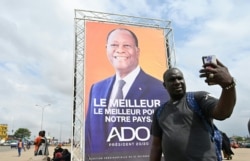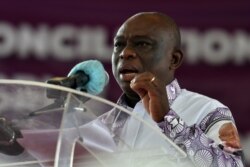As Ivory Coast’s president prepares to campaign for another term in office, his main challengers have called for a boycott of the Oct. 31 election, adding to widespread doubts about a fair and transparent vote.
President Alassane Ouattara’s two main challengers, Henri Konan Bedie and Pascal Affi N'Guessan, said Thursday they would boycott the vote and invited their supporters across the West African nation to do the same.
The opposition candidates want the “ruling party to agree to meet with all political forces” to discuss their concerns about the election.
They argue that Ouattara’s running for a third term is illegal. They have also been calling for the Constitutional Council which validated his candidacy dissolved, along with the Independent Electoral Commission, believing these institutions flawed.
There were originally 44 presidential candidates, but only four were accepted by the Constitutional Council. Thursday’s news could mean Ivory Coast’s election will be a two-man race — the incumbent Ouattara and independent candidate Kouadio Konan Bertin.
A spokesperson for the Ivorian Observatory for Human Rights said this election was meant to give the country a chance to show its democratic and political maturity, compared to past electoral violence. But, it said, with the ongoing issues, this would not be a fair or transparent election — and could lead to serious consequences.
The organization has called for the election to be postponed and restarted to include all political actors.
Tommaso Caprioglio, in Ivory Coast on a joint election observation mission with the Carter Center in collaboration with the Electoral Institute for Sustainable Democracy in Africa, said that after the opposition leaders announcement, it was unclear as to how the election will proceed.
Caprioglio said it was crucial the different parties resolve their issues before people go to the polls.
“We think the dialogue is honestly really the only framework through which it will appear possible to find a mutual solution because, at the end, the goal for everyone is to have an inclusive, transparent and peaceful election here in Ivory Coast,” Caprioglio said.
Amnesty International’s Samira Daoud said there have been growing threats against activists and opposition members leading up to the election. She fears this might lead to instability in the upcoming weeks.
“The authorities have targeted and arrested scores of activists and opposition members these last weeks solely for expressing their political views or organizing peaceful protests so there is a risk, of course, to see more people arrested and consequently a growing discontent among the opposition,” Daoud said.
While local and international human rights and democracy organizations watch the campaign with trepidation, incumbent Ouattara told the United Nations General Assembly in September the election would be “peaceful and transparent as it was in 2015.”
Ouattara said the election will take place in a democratic environment that has been strengthened by major reforms. He also spoke of the economic and human progress made by Ivory Coast.
At the heart of the election controversy is presidential term limits. A new constitution approved in 2016 limits presidents to two five-year terms. Ouattara earlier said he would step down at the end of his second term this year, but after his chosen successor died unexpectedly he said he would run for a third term. He insists that his first two terms do not count toward term limits because the current constitution was not in force at that time.






